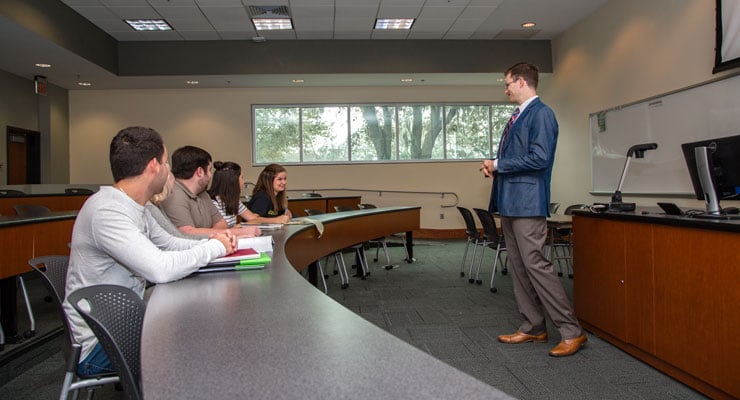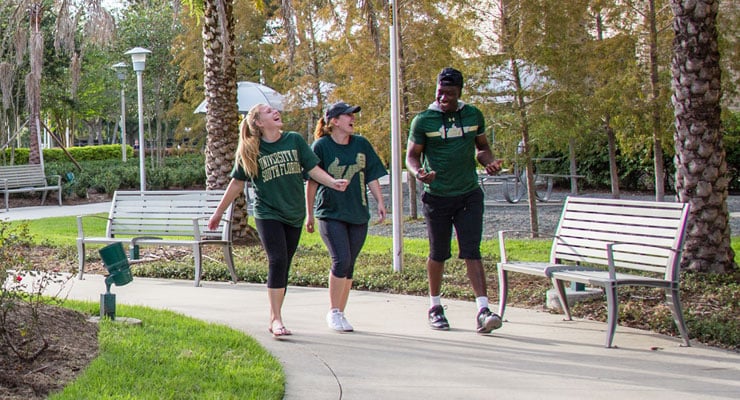What Are the Benefits of Smaller Class Size in College?
By Joe Emerson | Last Updated: Mar 5, 2025

Determining the optimum college class size is akin to finding the best setting on a residence hall thermostat. Satisfaction and results vary, and they depend on the class (residence hall) and the participants (roommates). That’s because one person’s comfort zone can be where another finds misery. There are, however, a number of good answers and supporting arguments for those who ask: What are the benefits of smaller class size in college?
5 Good Arguments for Smaller Class Size in College
What is the best college class size? Using class scores and performances as metrics, U.S. News & World Report found that classes with fewer than 20 students outperform those with more than 50 students.
Here are five things smaller classes make possible:
5. Discussion-Based Teaching
Don’t look here for a resolution of the great debate in academia over active/interactive versus lecture teaching formats. There’s value in both approaches, but it’s undeniable that the discussion format that smaller classes enable has a lot of benefits and fans.
The discussion format leads to more engagement between students and the instructor and among students. In fact, that interaction is unavoidable in small classes, which those on the shy side might consider a huge downside. That engagement yields a give-and-take that bares ideas and facts, yours included, and makes knowledge more accessible than the one-sided speeches behind those notes you hastily scribbled during a crowded lecture.
4. One-on-One Interaction
In small classes, there’s no hiding in the back of a lecture hall. Continual interaction between the instructor and class yields familiarity through proximity. You will get to know the instructor, and vice versa. That familiarity and the resulting engagement tends to enhance the flow of ideas and information.
From a teacher’s perspective, it’s easier to teach people whose strengths and weaknesses you know. From a student’s perspective, it’s easier to be open with someone who has the time to engage you.
Productive personal interaction isn’t just a student-teacher thing. That interaction also is a facet of student-to-student exchanges that can make learning a social phenomenon:
- Think knowledge embedded in memory through lively debates.
- Think productive out-of-class study groups and activities.
- Think a flow of ideas that can even benefit the instructor.

3. Opportunities to Engage
Continual interaction with the instructor and with students means you will be their sounding board and they will be yours:
- You will be able to ask questions when you have them and get answers immediately.
- You will be able to present ideas and opinions and refine them.
- You will be able to use the vocabulary and rhetoric of the topics you are studying and make them your own.
- You will be able to challenge others and be challenged, with everyone advancing.
There’s a nonacademic upside to this interaction. Some new students have a tough time getting involved on a college campus. Small classes allow you to learn in a way that can add people to your social circle and activities to your calendar.
2. Hands-on Learning
Given a group of manageable size, an instructor can do hands-on teaching in the classroom and in the field.
In-class projects can be tackled as a group or in several groups, with tasks ranging from building a robot to finding a practical application for math in everyday life.
Field work such as trips to workplaces are limited only by the imagination and the availability of willing partners outside the classroom.
1. Flexibility
All this personal interaction and engagement yields a huge dividend: the familiarity needed for an instructor to shape coursework and projects to the needs and speeds of each group of students.

Small Colleges Usually Mean Smaller Classes
There are a lot of things to consider when choosing a college, and class size is one. Typically, small colleges equal small classes, usually with two-thirds of a student’s classes having 20 or fewer students. However, there are many large universities that also offer smaller classes, depending on the class, the program, and other factors.
Honors Colleges and Programs Offer Small-School Perks
Honors programs are one way to attend a large research university such as USF while getting the perks of a small college. Here’s a small part of what it means to be a USF Honors College student:
- Small classes that feature close interaction with instructors, experts in a variety of fields, and peers who are top achievers.
- Honors-exclusive housing that puts students in close contact with like-minded students.
- Exposure in and out of class to staff accustomed to working with students who push the academic envelope.
The USF Honors College application window opens in August. However, small classes aren’t exclusive to just the Honors College at USF. For general application questions, the USF Office of Admissions always is ready with advice and answers. Contact us online, or reach us by phone at 813-974-3350.


